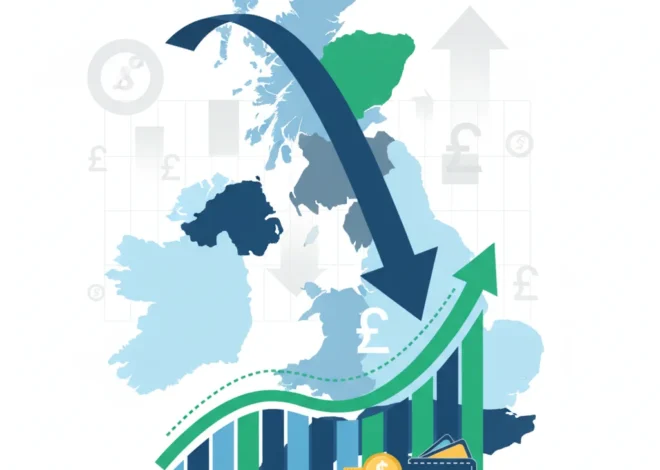
UK Economy Shakes Off Pessimism: IMF Forecasts Second-Fastest G7 Growth
In a striking reversal of fortune that has caught many analysts by surprise, the United Kingdom’s economy is now projected to be the second-fastest growing among the G7 nations this year. This optimistic verdict comes from the International Monetary Fund (IMF), which has significantly upgraded its growth forecast for the UK. The announcement marks a pivotal moment, shifting the narrative from one of stagnation and uncertainty to one of resilience and recovery.
For months, the prevailing sentiment surrounding the UK economy has been cautious at best. Battling persistent inflation, rising interest rates, and the lingering effects of global shocks, the path forward seemed fraught with challenges. However, this latest projection from one of the world’s foremost financial institutions suggests that the foundations of the UK’s economic engine are stronger than previously believed. This isn’t just a minor statistical adjustment; it’s a signal that could have profound implications for investing, business strategy, and the broader world of finance.
In this comprehensive analysis, we will dissect the IMF’s new forecast, explore the key drivers behind this sudden wave of optimism, and examine what it means for investors, business leaders, and professionals in the banking and fintech sectors. We will also maintain a balanced perspective by considering the potential headwinds that still lie on the horizon.
A Closer Look at the Numbers: The UK’s G7 Standing
The IMF’s updated forecast projects the UK economy to grow by 0.7% in 2024. While this figure may seem modest in absolute terms, its significance lies in the substantial upward revision from a previous estimate of just 0.5% (source). This 0.2 percentage point upgrade is a material change in economic forecasting, indicating a tangible improvement in underlying conditions.
Crucially, this new projection places the UK ahead of every other G7 nation except for the United States. To put this into perspective, here is a comparative look at the UK’s revised forecast and its standing within the Group of Seven leading economies.
| G7 Nation | Growth Forecast Status | Key Context |
|---|---|---|
| United States | Leading Growth | The US remains the primary engine of growth among advanced economies. |
| United Kingdom | Second-Fastest Growth (0.7%) | Represents a significant upgrade and a shift in economic outlook. |
| Canada | Slower Growth | Projected to grow at a more moderate pace than the US and UK. |
| France | Slower Growth | Facing headwinds common across the Eurozone. |
| Germany | Stagnation/Minimal Growth | Europe’s largest economy continues to struggle with industrial and structural challenges. |
| Italy | Slower Growth | Navigating high debt levels and moderate growth prospects. |
| Japan | Slower Growth | Experiencing modest growth amid currency pressures and policy shifts. |
This league table positioning is more than just a matter of national pride. It influences international investment flows, currency valuations, and the overall confidence that global markets place in the UK’s economic stewardship. The upgrade suggests that the UK has navigated the post-pandemic inflationary shock more effectively than many of its European peers (source).
The Engines of Recovery: What’s Driving the UK’s Economic Resilience?
The IMF’s optimism isn’t unfounded. It’s rooted in several key economic trends that have gathered momentum in recent months. Understanding these drivers is crucial for anyone involved in economics or financial planning.
1. Taming Inflation and Boosting Real Incomes
The primary factor is the faster-than-expected decline in inflation. As price pressures ease, the squeeze on household budgets is beginning to loosen. For the first time in nearly two years, wages are consistently growing faster than inflation, leading to an increase in real disposable income. This newfound purchasing power is the lifeblood of a consumer-driven economy, translating directly into stronger retail sales and demand for services.
2. A Resilient Labour Market
Despite forecasts of a significant rise in unemployment, the UK labour market has remained remarkably robust. While there has been some softening, employment levels are high by historical standards. This stability provides a crucial foundation for consumer confidence and spending, preventing the kind of sharp economic contraction that often accompanies a major interest rate hiking cycle.
3. The Normalization of Energy Prices
The extreme volatility in energy markets that defined the past two years has subsided. Lower wholesale gas and electricity prices have filtered down to consumers and businesses, reducing a major source of cost pressure across the economy. This has not only helped bring down headline inflation but has also improved business margins and investment viability.
Implications Across the Financial Spectrum
An improved economic outlook has far-reaching consequences. From the individual investor managing their portfolio to the CEO of a multinational corporation, this shift in the UK’s economic trajectory demands attention and strategic adjustment.
For the Stock Market and Investors
A stronger domestic economy is typically a bullish signal for the stock market, particularly for companies listed on the FTSE 250, which is more UK-focused than the globally-oriented FTSE 100. Sectors like retail, hospitality, construction, and real estate could see improved investor sentiment. For those involved in trading, this may signal a shift from defensive stocks towards more cyclical, growth-oriented assets. However, the outlook for interest rate cuts by the Bank of England becomes more complex. Stronger growth could persuade the Monetary Policy Committee to hold rates higher for longer to ensure inflation is fully extinguished, which could temper equity market enthusiasm.
For Banking and Financial Services
The banking sector benefits from a healthier economy through lower loan defaults and increased demand for credit from both consumers and businesses. This improved credit environment strengthens bank balance sheets and profitability. The forecast might also spur more activity in corporate finance, including mergers, acquisitions, and IPOs, as businesses gain confidence to pursue expansionary strategies.
For Fintech and Financial Technology
Innovation thrives in a stable and growing economy. The financial technology sector, a cornerstone of the modern UK economy, is set to benefit significantly. Increased consumer confidence can accelerate the adoption of new digital payment systems, investment platforms, and neo-banking services. Furthermore, a positive economic climate attracts venture capital, providing the fuel for the next generation of fintech startups. There may even be renewed corporate appetite for investing in transformative technologies like distributed ledgers and blockchain to improve efficiency and create new products, a trend that often stalls during downturns.
Navigating the Headwinds: A Balanced View of the Risks
No economic forecast is without its caveats. While the immediate outlook has brightened, several challenges could still disrupt the UK’s recovery. A prudent investment and business strategy must account for these potential risks.
- Sticky Core Inflation: While headline inflation has fallen, core inflation (which excludes volatile food and energy prices) has proven more stubborn. If this persists, it could force the Bank of England to maintain a restrictive monetary policy, acting as a brake on growth.
- The Global Economic Context: The UK is an open economy, highly sensitive to global demand. A slowdown in key trading partners, particularly in the Eurozone or China, would inevitably impact UK exporters and multinational corporations.
- The Productivity Puzzle: A long-term challenge for the UK has been its sluggish productivity growth. The current recovery is largely based on consumption. For sustainable long-term prosperity, the UK must find ways to boost output per hour worked through investment in technology, infrastructure, and skills. According to the IMF’s report, boosting business investment is a key priority.
- Geopolitical Instability: Ongoing conflicts and trade tensions continue to pose a risk to global supply chains and energy security, with the potential to reignite inflationary pressures.
Conclusion: A New Chapter for the UK Economy
The IMF’s decision to upgrade the UK’s growth forecast is a significant vote of confidence. It signals that the economy has successfully weathered a severe storm of inflation and interest rate hikes, emerging on a much firmer footing than anticipated. This resilience, driven by falling inflation and a stable labour market, positions the UK as a surprising leader among its G7 peers.
For those in the world of finance, from individual investors to institutional leaders, this is a moment to reassess and recalibrate. The narrative has shifted from defence to opportunity. While significant challenges undoubtedly remain, the economic landscape in the UK now appears more fertile for growth, innovation, and investment than it has for some time. The key to success will be in harnessing this renewed momentum while remaining vigilant to the risks that still lie on the path to a full and sustained recovery.


